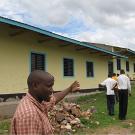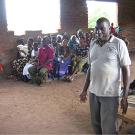Simple examples of this would be the installation of a water system. The community should be engaged from the beginning in selecting the appropriate type of water system, its location, and its installation. This will not only generate their ownership of the system—but they will understand how it went together in case they need to fix it. The next stage would to be for the NGO to provide training in collecting water use fees, routine system maintenance, repair, and ideas on how to connect with a future expert in case they run into a problem.
In our courses OL 343 and 344 it takes approximately 6 months for course participants to go through this set of exercises with their community.
| Charles Loleku describing the school dormitory. | |
 |
So for example they have:
|
You can read about their project and download two field reports with photographs.
They completed their basic community training workshops in December, but because of a few complications and a change of staff they weren’t able to get back to the community for four months to complete the capacity building workshops and get on with the process of handing the project over to the community.
Chris was very surprised to return to the community in April because he discovered that they had finished most of the project! Chris says “In fact they had made so much progress that the work plan that we were going to initiate with them was no longer relevant as the community had progressed beyond the work plan”.
He goes on to describe that based upon the brief training the community received from his organization on advocacy—they went to the District Medical Officer and requested support and a physician for their community. In the four months since they launched their advocacy campaign they now have a completely remodeled health facility and a physician!
| Village agriculture officer sharing about new cassava crops planted with Chris’s help. | |
 |
The community then rallied to raise funds to build houses for teachers on school property, and a dormitory for young children that live to far a way . They were successful in completing the housing and dormitory and the school has three new full-time teachers and four new interns.
|
Last fall Chris’s organization began with improved agricultural training that was meant to be followed up by further workshops—but with the basic training they received one farmer told him:
“Agriculture in Wagete this year is completely different from what it was last year. Last year many farmers would stand in one place and throw seeds across the field from their hips without understanding how to ensure that they entered the soil properly or were properly spaced out. As a result, harvests would be very poor. This year farmers are planting their crops and clear rows, with proper spacing, and the improved seed varieties are showing much improvement and drought resiliency over previous crops. Farmers are excited about their crops in Wagete, and that is what I am smiling about.”
Chris asked the community what motivated them to carry on with the project on their own. The community leaders said that the discussions that Chris had with them in the workshops brought key issues to the surface and they started talking amongst themselves about how they could deal with them. The community decided that they were Wagete’s problems, not Chris’s organization’s problems, so they should be the ones to tackle the problems themselves.
All that they had needed from Chris’s organization was the motivation and some basic training on how to go to the District Medical Officer to request a doctor. Then, when they saw the condition of their school and wanted to improve that as well. They raised their own funds to build houses for the teachers and a dormitory for children.
Now that most of the project had been completed, the village management committee has not requested additional management training for their committee, and also additional training in improved agricultural practices such as conservation agriculture, composting, mulching, irrigation, and the use of improved seed varieties. Chris will begin working with them throughout the course of this year to grant this request.
Way to go Chris!
You can read about this latest accomplishment by downloading Chris’s report from his last meeting with the community: OL 344 Enns Assignment 2.
If you would like to learn how to develop community-based projects like this simply visit our overview of our community based adaptation diploma. If you don’t have access to a community—don’t worry—we’ll simply partner you with someone like Chris!
We look forward to working with you online.
Would you like to learn how to develop Community Based Adaptation Projects?
Please write us with your stories, thoughts and comments through Online.Learning@csd-i.org








